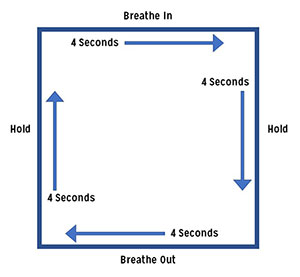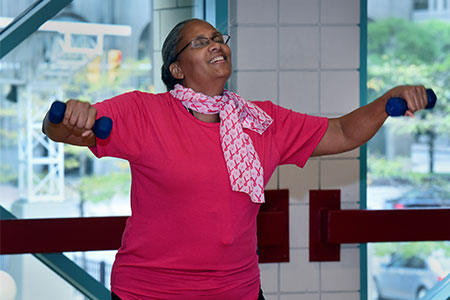Breathing Exercises
Breathing exercises are an easy way to relieve stress and anxiety, and you can do them anywhere! Henry Ford experts explain 3 breathing techniques and when to use them.
Stress is defined as emotional tension or mental strain. When a person is diagnosed with cancer, it can cause stress or other strong emotions that come with facing the unknown. This is very normal. Stress is a common feeling for most people, but how we choose to cope with the feeling of stress and the problems causing it makes all the difference. Typically, people approach problems in one of two ways: actively working on them or avoiding them. In general, active coping works better and is healthier.
Things to Practice
Things to Avoid
There are different ways you can cope with stress and prepare your mind to cope with a cancer diagnosis in a healthy way. At Henry Ford Cancer, we treat the whole person, and are here to help you with physical and emotional needs before, during and after cancer treatment. Below are some different techniques and activities to help you cope with your emotions in a healthy way.
 The National Cancer Institute explains meditation as “a mind–body practice in which you focus your attention on something, such as an object, word, phrase, or breathing, to help you find comfort and meaning.” If you have recently been diagnosed with cancer or are facing complications, your mind can be so full of worry and stress, it is a struggle to be present and aware of what’s going on around you.
The National Cancer Institute explains meditation as “a mind–body practice in which you focus your attention on something, such as an object, word, phrase, or breathing, to help you find comfort and meaning.” If you have recently been diagnosed with cancer or are facing complications, your mind can be so full of worry and stress, it is a struggle to be present and aware of what’s going on around you.
These exercises help you relax and take back a feeling of control over your life. The following guided relaxation exercises were put together by Henry Ford Health experts.
 Box breathing
Box breathingThe Henry Ford Center for Integrative Medicine has experts that specialize in teaching people to meditate.
 Mindfulness is when a person focuses only on experiences happening in the present. Another way to describe mindfulness is “being in the moment.”
Mindfulness is when a person focuses only on experiences happening in the present. Another way to describe mindfulness is “being in the moment.”
Mindfulness can be practiced through meditation, conscious breathing or other exercises focusing your 5 senses.
Practice mindfulness anywhere guided by these free mindfulness apps for your phone or tablet:
Expressing yourself through art can have a therapeutic effect on your mind and body. Creating art will help you to slow down and explore any issues you may be having. While there are many benefits to working with a certified art therapist, there are also many simple activities you can try from the comfort of your home, like art journaling, sketching, coloring, making collages, sculpting with clay, etc. that can give you similar benefits.
Learn more about art therapy at Henry Ford Cancer.
Good quality sleep is important for all aspects of life, especially while in cancer treatment. Good quality sleep is linked to improved mood and decreased anxiety and depression.
For more information on sleep hygiene, visit American Sleep Association.

Besides improving mental health, studies have shown that regular exercise helps to prevent cancer and help cancer patients and post-treatment survivors live longer.

Breathing exercises are an easy way to relieve stress and anxiety, and you can do them anywhere! Henry Ford experts explain 3 breathing techniques and when to use them.
Let our psych-oncology experts help you and your family cope with the stressors associated with cancer in a healthy, adaptive way, from diagnosis through survivorship. We offer in-person and virtual appointments.

We use cookies to improve your website experience. By using this site, you agree to our Terms of Use. Read our Internet Privacy Statement to learn what information we collect and how we use it.